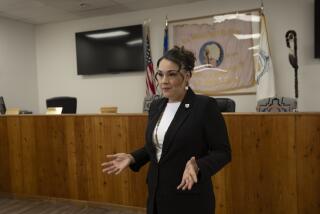Panel Narrowly Backs Nominee for Gaming Post
- Share via
SACRAMENTO — Gov. Gray Davis’ nominee to head the newly formed Gambling Control Commission narrowly won support Monday from a key Senate committee, despite opposition from the head of one of the state’s most politically influential casino-operating Indian tribes.
Three Democrats on the Senate Rules Committee voted to approve the nomination of John Hensley to be chairman of the gambling commission, a $114,000-a-year post. Two Republicans on the five-member committee abstained, citing opposition by Mark A. Macarro, chairman of the Pechanga tribe in Riverside.
Hensley was endorsed by several tribes, as well as labor organizations representing police.
Hensley’s nomination now goes to the full Senate. Macarro said he probably will continue to fight Hensley’s confirmation.
In a letter to the committee, Macarro denounced Hensley for making “unilateral interpretations” of key provisions of the compacts that Davis negotiated with tribes in 1999 that legalized Nevada-style casinos on tribal land.
“Marginalizing certain tribes and favoring others,” Macarro said in the letter, “Mr. Hensley has served to undermine the tribal-state gaming compact and the spirit of mutual cooperation between sovereign governments.”
Others were skeptical.
“Where are the other tribes in opposition?” Senate President John Burton (D-San Francisco), the Rules Committee chairman, asked Macarro.
“I think Mr. Hensley has told them things they want to hear to placate them,” Macarro said.
Unable to resolve an array of gambling-related issues, the Pechanga and San Manuel Band in San Bernardino have begun a “meet-and-confer” process with the state. If that fails, the tribes could sue and have the courts interpret the compacts.
The disagreement involves the commission’s authority over Indian gambling. In his testimony, Macarro said the commission has a “rather ministerial” role regarding tribal casinos.
Hensley acknowledged that the compact negotiated by Davis gives the state limited authority to oversee Indian casinos. But Hensley also has pushed for a subpoena of records to verify the number of highly profitable slot machines held by various tribes. Hensley received the information earlier this year.
Until Hensley received the details, the commission held up payments of millions of dollars authorized by the compact to tribes that have no gambling operations or relatively small casinos. Macarro, whose tribe has one of the largest casinos, said Hensley had no authority to withhold the money.
Slot machines are by far the most profitable casino games, generating $100 to $300 per day per machine. In casinos with 2,000 slot machines, the maximum allowed for a single tribe by the compact, a tribe could generate $73 million to $219 million a year.
The Pechangas have been one of the biggest campaign donors in state politics in recent years, spending more than $8 million since 1998 to win passage of gambling propositions and to support or oppose candidates. The tribe has increased its influence by forming an alliance with the powerful California Correctional Peace Officers Assn., the union that represents state prison guards.
More to Read
Get the L.A. Times Politics newsletter
Deeply reported insights into legislation, politics and policy from Sacramento, Washington and beyond. In your inbox twice per week.
You may occasionally receive promotional content from the Los Angeles Times.










